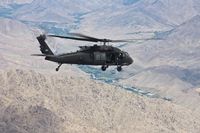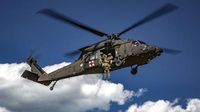Collins Aerospace, a subsidiary of RTX, has secured an $80 million contract to enhance the avionics systems of U.S. Army Black Hawk helicopters as part of the H-60M MOSA Avionics Architecture Solution programme. This major modernization initiative comes as the U.S. Army commits to upgrading its UH-60M Black Hawk fleet, ensuring these vital aircraft meet modern operational demands.
The upgrade will leverage Mosarc®, Collins Aerospace's family of Modular Open Systems Approach (MOSA)-compliant products, which are specifically designed to facilitate the integration of new technologies on the battlefield. This modular system is anticipated to provide soldiers with the capability to update avionics technology in real-time, allowing for increased operational flexibility in rapidly changing environments.
“Mosarc will provide U.S. Army Black Hawk cockpits with an open systems architecture, enabling swift integration of new capabilities to keep pace with modern operational demands,” explained Jenny Miller, Vice President and General Manager of Military Avionics and Helicopters at Collins Aerospace. This enhanced interoperability is not just a technical requirement but is vital for joint and coalition operations, emphasizing the importance of collaboration among different military branches.
Furthermore, the Mosarc system is designed to improve the efficiency of system upgrades while simultaneously reducing long-term sustainment costs throughout the lifespan of the helicopters. By streamlining maintenance and operational processes for both manned and unmanned aircraft, the program reflects a significant leap forward in the U.S. Army's modernization efforts.
The work related to this contract will be executed at Collins Aerospace facilities located in Cedar Rapids, Iowa, and Huntsville, Alabama. Production is set to commence this year, as teams actively engage in the integration process. This timely upgrade aims to ensure the Black Hawk fleet remains at the cutting edge, capable of adapting to the evolving landscape of modern warfare.
Operational efficiency and the ability to adapt to new technological advancements are critical in military aviation, and Collins Aerospace's enhancements are set to bolster the capabilities of U.S. Army helicopters significantly. The upgraded avionics are not just about technology; they represent a commitment to maintaining operational readiness in a complex global environment.
The initiative is part of a broader strategy to modernize the entire aviation fleet of the U.S. Army, addressing the urgent need for flexibility and readiness in future missions. As the world continues to change rapidly, so does the need for the U.S. Army to enhance its technological capabilities, ensuring that soldiers are equipped with the best tools available.
This contract underlines Collins Aerospace's ongoing commitment to innovation and excellence within military avionics, reinforcing its reputation as a leader in this essential sector. As modernization efforts kick off, the focus will be on ensuring that Black Hawk helicopters remain relevant and effective in the face of emerging challenges.
With this significant contract in hand, Collins Aerospace is poised to make meaningful contributions that will impact the U.S. Army’s operational efficiency and effectiveness for years to come. The efforts to modernize these helicopters underscore a larger trend in military aviation—recognizing that leveraging cutting-edge technology will be crucial in maintaining battlefield superiority.
As militants and adversaries continue to evolve their tactics, the U.S. Army must ensure that its aircraft remain equipped not only to respond to current challenges but also to anticipate future conflicts. The Mosarc system is set to play a pivotal role in this strategy, giving U.S. forces the advanced capabilities they need for mission success.
This $80 million contract signposts a new era for the U.S. Army's fleet of Black Hawks, as it embarks on a journey toward modernized operations in an increasingly complex global landscape. Collins Aerospace will work diligently to deliver on its commitment to the U.S. military, providing the necessary upgrades and evolving technologies to keep pace with the demands of contemporary warfare.





